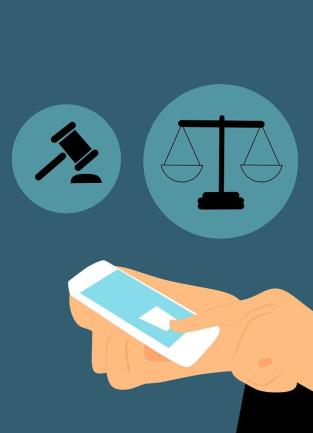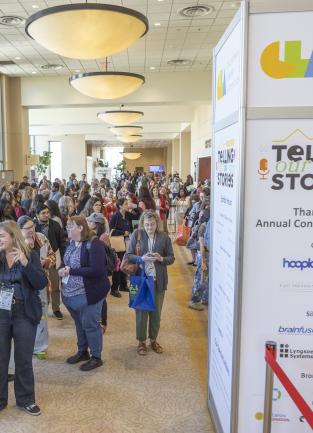AALL Conference Keynote on Learning How to Learn Anything!

July 24, 2020
The American Association of Law Libraries (AALL) held its Virtual Conference last week. Originally set for New Orleans, the conference, themed "Unmasking Our Potential", drew more than 1000 information professionals from across the world. Hundreds of them tuned in on Tuesday morning to the Opening Keynote of Jim Kwik, a widely recognized world expert on memory improvement, brain optimization, and accelerated learning.
Kwik, his real name, author of Limitless: Upgrade Your Brain, Learn Anything Faster, And Unlock Your Exceptional Life shared powerful strategies on how to master our most important asset, our brain. His keynote speech How to Master Your Mind: Learn Anything & Become Limitless began with the question, how does one become limitless in a limited world? He said, "Life is a C between B & D". C stands for choice, B stands for birth, and D stands for death. His speech is peppered with mnemonic devices he created intended as effective learning and memory tools. He talked about the power of choice. The choices we make in life can define, diminish, or develop us. While we may feel tired and restless being cooped up in our homes during this pandemic, Kwik offered that we view ourselves as being in a cocoon and choose to learn and grow while in the cocoon and come out of it transformed like a butterfly. He talked about the 5 Cs – Five Choices: Clarity, Care, Contribution, Creativity, and Capability.
- Clarity is power, it provides the energy that drives our action. Having clarity about our purpose, about the reason why we want to learn about a subject or why it is important for us to learn about that subject, fuels our drive to persist in learning no matter how difficult the process gets. Kwik reminded us that we need to check-in with ourselves and ask ourselves, what is most important to us in life, in this moment, in our career? When we do not have clarity about our life's purpose or what is important to us, we burn-out. What burns us out is not the amount of work that we do; it is spending our time and energy on things, relationships or activities that are not aligned with what is truly important to us. We need to value our time alone with ourselves. Solitude is time spent for reflection.
- Care – Self-care is not selfish. Just as we practice physical hygiene, we also must practice mental hygiene. We need to take care of our mind power. Kwik calls it our “super mind”. We can choose to spend the first half hour of our day reading a book or meditating. We need to make a conscious choice of what we feed our mind and control what we put in our mind. He provided his top 10 brain foods and sample day recipes to optimize brain power in his Limitless book. He also included his "kwik" list of some of his favorite mindset, motivation, and method books.
- Contribution – Chronic stress shrinks our brain. It puts us in a “flight or fight” mode. Brain fear suppresses our immune system and the antidote to fear is contribution. Kwik encouraged us to think: how are we investing our in making a contribution? Spending time serving others, volunteering, and giving back to the community calms your mind. It frees our mind from the stresses seeping through our daily life during this pandemic.
- Creativity – Learning is not a spectator's sport. The human brain learns more by creation than by consumption. During this pandemic, we have the choice to engage in creativity such as writing and teaching or be passive consumers of information and watch rather than act. Kwik suggested to ask ourselves how can we become more active in our learning? He said, learn with the intention to teach because when we teach, we get to learn twice.
- Capability – We all have the capability to learn, and our capacity to learn is limitless. Kwik encouraged us to make a To Learn List and commit to it. Whether it be learning how to speak Spanish or how to play the piano, we can learn it. We can learn little by little and little by little becomes a lot.
In his keynote, Kwik covered a lot of the practical strategies and advice he wrote in his book about becoming limitless. He talked about how to access our brain's limitless capacity to learn through meta learning (learning how to learn). He talked about the mindset, motivation, and methods to master our mind and learn more effectively and faster. He shared his 4 Keys of Excellent Memory - FAST: Forget temporarily what you know about a subject. Our mind is a parachute, it works only when it is open. Forget about distractions. We cannot multi-task, we are only shifting tasks which burns a lot of brain energy. Active, memory is an act of attention not retention. The human brain learns through creation, not consumption. State, learning is state-dependent. The key is information combined with emotion becomes long-term memory. We remember things that we have an emotional connection with. When we take control of our state of mind and body, we can shift our learning experience from boredom to excitement and what we learn becomes unforgettable. Teach, when we learn with the intention to teach others, our approach to learning becomes active. In active learning, we pay closer attention, we take better notes, and ask better questions because we need to master what we learn to be able to explain to someone else. Another mnemonic memory device he created is MOM: Motivation, Observation, Methods. We are more likely to remember things that we are strongly motivated to remember. We are more likely to remember things when we pay attention, observing the things and being present in the moment. Kwik provides the tools on how to remember and some of these he shared in his keynote and so much more are covered in his book.
If there is just one thing I will remember about this keynote, it is when Kwik said, I forgot is the most costly word. Having good learning skills in the online world matters now more than ever. It is critical to learn how to take control and be free from the limiting forces of the four horsemen of our age: digital deluge, digital distraction, digital dementia, and digital deduction, that Kwik discussed in his book.
We now accept the fact that learning is a lifelong process of keeping abreast of change. And the most pressing task is to teach people how to learn. – Peter Drucker.











